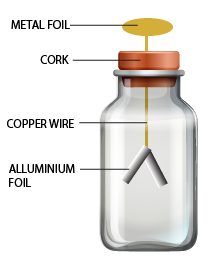Some Natural Phenomena Class 8 important questions with answers PDF download
FAQs on Important Questions For Class 8 Science Chapter 12 Some Natural Phenomena - 2025-26
1. What are some of the most frequently asked 3-mark questions from the chapter Some Natural Phenomena for the CBSE 2025-26 exam?
Based on previous board trends, some expected 3-mark questions for the Class 8 Science exam focus on core concepts. Students should prepare for questions such as:
Explain the process of lightning formation with a simple diagram showing charge separation in clouds.
Describe three safety measures you must take to protect yourself from a lightning strike if you are outdoors.
What is an electroscope? Explain how it helps in detecting charge on an object.
2. Explain how lightning occurs between clouds and the Earth.
Lightning is a massive electrostatic discharge. The process begins during the development of a thunderstorm. Here’s a step-by-step explanation:
Charge Separation: Air currents inside storm clouds cause water droplets and ice crystals to rub against each other. This friction separates charges, causing the upper part of the cloud to become positively charged and the lower part to become negatively charged.
Induction: The negative charge at the bottom of the cloud induces a positive charge on the surface of the Earth below it.
Electric Discharge: When the magnitude of the accumulated charge becomes very large, the insulating capacity of the air breaks down. This results in a massive flow of electric current between the cloud and the ground, which we see as a brilliant streak of light called lightning.
3. For 5 marks, list the safety precautions one should take during an earthquake, both indoors and outdoors.
To secure full marks, you should list precautions for both scenarios as per the NCERT syllabus:
If you are indoors:
Take shelter under a sturdy table or desk and hold on until the shaking stops. This is the 'Drop, Cover, and Hold On' technique.
Stay away from tall, heavy objects like cupboards, shelves, and windows that could fall and cause injury.
If you are in bed, protect your head with a pillow.
If you are outdoors:
Find a clear, open spot away from buildings, trees, overhead power lines, and poles.
If you are in a moving vehicle, ask the driver to stop in a safe, open area and remain inside the vehicle until the tremors cease.
4. Why can a plastic comb be charged by rubbing it on dry hair, but a copper rod cannot be charged in the same way?
This is a Higher Order Thinking Skills (HOTS) question. The key difference lies in the material's ability to conduct electricity. A plastic comb is an insulator, meaning it does not allow electric charge to flow through it easily. When you rub it, the charge generated by friction stays on its surface. In contrast, a copper rod is a good conductor. Any charge generated on it by friction immediately flows through the rod, into your hand, and then to the Earth (a process called earthing). Therefore, the copper rod does not retain the charge and remains neutral.
5. What are seismic zones, and why are they considered a higher risk for earthquakes?
Seismic zones, also known as fault zones, are areas on the Earth's crust where the boundaries of tectonic plates are located. These plates are in constant, slow motion. They are at a higher risk for earthquakes because:
The movement of tectonic plates can cause them to brush past one another or collide.
The edges of the plates can get locked, causing stress to build up over time.
When this stress overcomes the friction, the plates slip suddenly, releasing a massive amount of energy in the form of seismic waves. This sudden shaking is what we experience as an earthquake.
Regions located on these fault lines, such as the Himalayas and Kashmir in India, are therefore more prone to frequent earthquakes.
6. Why is it considered safer to be inside a car during a thunderstorm than standing in an open field?
This is a concept-based important question. It is safer inside a car not because of its rubber tyres, but because the car's metal body acts as a Faraday cage. If lightning strikes the car, the electric charge will travel over the outer metal surface and then to the ground, leaving the occupants inside unharmed. In contrast, a person standing in an open field becomes the tallest object in the vicinity, making them a likely target for a direct lightning strike, which is extremely dangerous.
7. How much more destructive is an earthquake of magnitude 7 on the Richter scale compared to an earthquake of magnitude 5?
This is a critical thinking question. The Richter scale is logarithmic, not linear. An increase of 1 on the scale represents a 10-fold increase in the measured amplitude of the seismic wave. However, the destructive energy released increases by about 32 times for each whole number increase. Therefore:
From magnitude 5 to 6, the destructive energy is 32 times greater.
From magnitude 6 to 7, the energy is another 32 times greater.
So, an earthquake of magnitude 7 is approximately 32 x 32 = 1024 times more destructive than an earthquake of magnitude 5.
8. If you bring a negatively charged rod near an uncharged electroscope, what will you observe and why?
When a negatively charged rod is brought near the metal disc of an uncharged electroscope, the following happens due to electrostatic induction:
The free electrons (negative charges) in the metal disc and rod of the electroscope are repelled by the negatively charged rod and move down to the gold leaves.
This leaves the metal disc with a net positive charge.
Both gold leaves accumulate excess negative charges. Since like charges repel, the leaves will diverge or move away from each other.
This observation confirms that an electroscope can detect the presence of charge without direct contact.

























